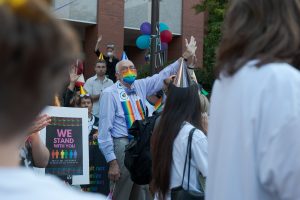Students of SPU: Regulations, reservations, inspirations
Music therapy student navigates the new COVID rules
October 16, 2020

Students that usually rely on in person classes like lab, theatre, or music are trying to find ways to navigate the new changes. Fall quarter opened up some in person classes, but it is still not back to the way it was before.
Junior music therapy major Cora Bruders started playing the flute in middle school, and decided in the eighth grade that she wanted to pursue music therapy as a career path.
“I had wanted to do therapy and music and this was kinda the perfect mix of both,” Bruders said.
There are not many schools that offer music therapy as a major. Seattle Pacific University happens to be one of the few that do.
“This is the only one in Washington, so it was close to enough to home where if I need to go home, I can,” she said. “Also, Seattle Pacific has a lot of different associations with different organizations around Seattle that are accredited.”
Bruders has found it especially difficult to find the motivation to practice with the new restrictions.
“Not being able to just go to a practice room in between classes, or play as early or as late as I usually did made it really hard to find time to play. At first the practice rooms weren’t open on the weekends so it was even harder at first,” Bruders said.
To use the practice rooms in Crawford, one not only has to reserve them, but also leave it open for two hours in between sessions to ventilate the room.
“We have to wipe everything down, and there’s only one person allowed in the practice room at a time,” Bruders said. “I pretty much only practice in the practice rooms … They have told us that we can play outside, but with everybody in zoom classes, I can’t even play in my dorm cause I don’t want to disturb other people while they’re in a class.”
Bruders does appreciate some aspects of the reservation system.
“With the schedule it gives me a timeline, and it pushes me to follow through on whichever rooms I do reserve,” she said. “Giving myself a routine and structure is really good right now when there’s not very many things that we can plan for.”
Musicians that play brass and wind instruments find it especially tough during the pandemic. There are certain steps that the students take to keep everyone safe and healthy.
“To be able to play we all have to wear masks first of all, and usually that involves cutting holes in it, altering it or buying specially made masks for our instruments.”
In order to catch exhaled droplets, students are required to put pillowcases over their wind and brass instruments. To ensure that nothing comes out of the pillowcases, they have to put a MERV 13 air filter inside.
“It’s really crazy, and it’s a really difficult adjustment,” Bruders said. “We have to put our hands through the pillowcase and then put our instruments through the masks so it’s really hard to get things done fast.”
Bruders has found that music has been somewhat of a therapy and an inspiration to her these last eight months.
“It’s definitely been good to listen to music, and find new music, just cause obviously I have a lot more time to explore that and look more into classical composers as well as modern,” she said.

Bruders has also felt that the pandemic opened up new doors for her in terms of music therapy and her own creative spirit.
“Music therapy with COVID has actually opened up a lot of new avenues with telehealth. We’re able to still have sessions and be with clients over Zoom, so it’s definitely different but it is still doable.”
With the practicum class that she’s in now, they’re able to have a bigger class size because not everyone is in person. She says that doing things virtually like this, may help music become more accessible to people, and reach a broader audience.
“I’ve never really done a lot of recording in music before. COVID has pushed me a lot to be able to do that and post my music places, which gives me a lot of newfound confidence in my music because I get really nervous in front of people,” Bruders said.
While navigating the new situation, she’s been inspired by other artists to reach out to friends and potentially collaborate with them on music projects, virtually.
“It just opens up a lot of new opportunities to reach out to others across the country especially in a time where we’re not able to physically be together, but we can still be together musically,” Bruders said.

























































































